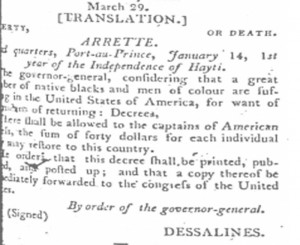- Depi nan Ginen bon Nèg ap ede Nèg!
- jafrikayiti@gmail.com
When refugees from North America went South to Haiti

Has Canada Reached Maturity at 150?
July 1, 2017
Canada’s next astronaut has just crossed the border and she needs your help
August 7, 2017When refugees from North America went South to Haiti

Two hundred years ago, Haiti represented a refuge (uniquely so, for a long time!) and a land of opportunity to scores of men, women and children all over the Americas, including refugees from the United States of North-America.
Barely days after the creation of the Republic of Haiti, its noble Founding Father, Jean-Jacques Dessalines, published a decree, dated January 14, 1804, in which he announced devoting part of the new nation’s meager post-war budget to securing the emancipation of formerly enslaved human beings.

Dessalines’ generous abolitionist offer was heard far and wide. Many American slave ship captains collected the 40 dollars payment he had reserved for the release of each formerly enslaved person who sets foot on Haitian soil. Dessalines also offered freedom and Haitian citizenship to soldiers from Poland and Germany who were brought to Haiti as part of Napoleon Bonaparte’s defeated army.
From the days of Dessalines and on to Haiti’s subsequent leaders Petion, Boyer, Geffrard and Soulouque, several thousands left U.S. shores, seeking and finding refuge in Haiti.
“Lè ou wè vye zo nan chimen, konnen li te gen chè sou li yon jou” – when you see old bone by the road, be mindful that it had once carried flesh and muscles says the Haitian proverb.



